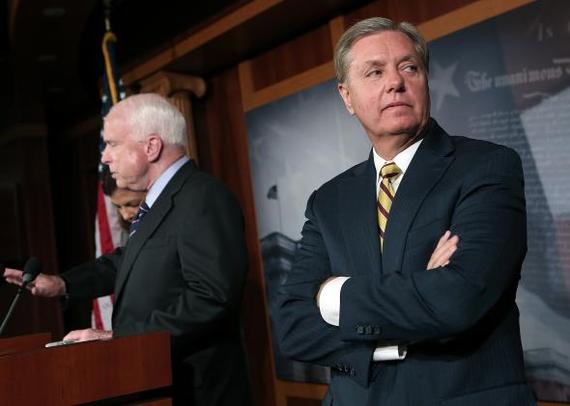If the disappointing midterm elections this month can be described as the first step in President Obama's journey as a lame-duck for the next two years of his presidency, then January 6, 2015 will be Step 2 on the long and lonely road of a two-term Commander-in-Chief. It's on that date when the 114th Congress (at least on the Senate side) is scheduled to meet for the first time under its new roster--one that includes at least eight new Republicans senators and the largest Republican majority in the House since the days of Harry Truman. It's safe to assume that the Obama administration is looking forward to January 6 of next year as much as a person looks forward to spending his off-day at the dentist.
Senator John McCain, the most persistent critic (and undoubtably the loudest one) of Obama's foreign and national security policy, is on a mission to make sure that the 114th Congress is the administration's worst nightmare in the Washington area. According to John T. Bennett of Defense News, McCain is working behind the scenes to assemble a team in the Senate that will serve as a kind of 'shadow government' to the Obama White House on matters pertaining to national security. The purpose, McCain says, is to hold the administration accountable on the decisions that it has made and provide a set of foreign policy alternatives that he hopes will push President Obama towards a more hawkish direction during his last two years. "What I think all of us, on an equal basis, want," McCain tells Defense News, "is to coordinate our efforts toward common goals." If building a coordinated effort will also cause migraines in a White House already struggling to retain the public's confidence, that would be a bonus for newly ascendant Republicans in the chamber.
"We have no doubt that Senator McCain will be a formidable adversary as chairman of the Armed Forces Committee," a senior administration official told The New York Times. But "formidable" might be too temperate a word--if McCain is his old-self next year, the Armed Services Committee will become ground zero for the kind of anti-Obama, anti-dovish, pro-intervention, hawkish sentiment that the senator has been known to blast into the gallery during speeches on the Senate floor. McCain has called the administration's anti-ISIL plan under-resourced and naive, its Syria strategy as "a failure," and its refusal to provide the Ukrainian army with weapons for self-defense purposes "shameful." One can imagine a future Chairman McCain using precisely these kinds of adjectives directly to senior administration officials throughout the multiple hearings that he will control from his new perch.
If McCain will serve as the honorary president of this new shadow government, Senators Bob Corker, Richard Burr, Lindsey Graham, and Ron Johnson will all be included in his cabinet. Each and every one of these senators has used their status in the chamber to blast President Obama--at times at a personal level. Corker will head up the Foreign Relations Committee come January, and if his time as Chairman will resemble anything like a scathing op-ed that he wrote for The Washington Post this past August ("this president proves that he is uncomfortable being commander in chief," Corker wrote), then Secretary John Kerry could be in for a world of hurt when he's asked to represent the administration in public testimony. Richard Burr will perform a similar, but more discreet, role when he climbs to the top of the ladder on the Intelligence Committee--a tenure that could be very different from Diane Feinstein's more confrontational posture towards the Central Intelligence Agency and the controversy over enhanced interrogation techniques.
Ron Johnson is predicted to be tapped by the Republican leadership as the next chair of the Senate Homeland Security Committee, and Lindsey Graham will single-handedly control the purse-strings on U.S. foreign aid. As leader of the State, Foreign Operations Subcommittee on Appropriations, Graham will be able to use his power to set the agenda on which nations receive assistance under the Foreign Military Financing program, how that assistance will be allocated, and whether any conditions will need to be met before the State Department is allowed to release the money. It's a powerful position for an Obama critic that is just as hawkish as John McCain.
The McCain-Corker-Graham-Burr-Johnson team, of course, will not have unlimited power--even when Republicans hold the majority in the Senate. As the nation's sole Commander-in-Chief, President Obama has wide latitude on conducting U.S. foreign policy. And on some of the most crucial issues, like negotiations on Iran's nuclear program, the president has the authority to waive U.S. sanctions on a temporary basis without congressional approval.
Nevertheless, the Mccain-led "shadow government" will still be able to frustrate the White House on everything from the war in Eastern Ukraine to the military campaign against ISIL. Key ambassadorial appointments could be blocked; a busy hearing schedule can be arranged; funds can be withheld; legislation can be formed that force the president's hand; and national security can be elevated as an important topic on the minds of voters ahead of the 2016 presidential contest.
John McCain would much rather have been elected president back in 2008, but for a man who was soundly defeated by Obama, being a Shadow President against that very same man is the perhaps the second-best thing that he could have hoped for.

